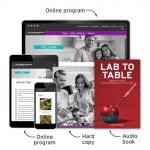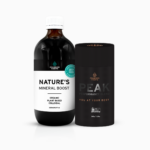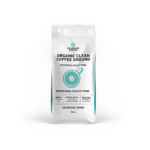If like me, you’ve watched the hit documentary, Fantastic Fungi, on Netflix recently, I’m sure you’ve sprouted an interest in Chaga and Chicken of the Woods too. Not long after watching the documentary, I listened to Joe Rogan’s interview with the incredible mycologist, Paul Stamets (Episode #1035), (I listened to it twice because of the amazing information on fungi for both soil health and human health) I was so excited that I decided it was time to give it a go. My husband purchased medicinal mushrooms, and I was particularly interested in the Lion’s Mane, so I grabbed a bottle and decided I’d try pairing it with my coffee. Just as I was about to drop it in my long black I thought I’d better read the ingredients just to make sure. The third ingredient was a ‘mushroom flavour’ the last ingredient was another flavour. The fourth ingredient was the Lion’s Mane. I placed the bottle down and shook my head in disbelief. The brand we had purchased from, I had believed to be a pioneer and ethical company. But maybe they were just naïve to what the flavours actually were.
After watching Fantastic Fungi, I knew that mushrooms and fungi play a master role in saving soil health and human health. And in my opinion, if mushrooms are your business then perhaps you want to see a shift in consciousness about the health of humans and the planet and are actively trying to instil change. But, after 42 years in the game, maybe my expectations are too high.
I emailed the company about the flavours and received a response saying “This is a requirement from the current FSANZ standard regulations. We do not use artificial flavouring agents in our liquid extracts. Our liquid extracts are made from organic ingredients and wild-harvested Kakadu Plum”.
The Kakadu plum was the flavour, not an extract. There’s nothing medicinal about wild-harvested Kakadu plum. The tinctures were not certified organic and quite frankly I cannot see FSANZ enforcing the inclusion of a flavour as a requisite in food safety. There goes another brand I couldn’t trust or endorse added to the list.
I replied to the company telling them I was very disappointed in their product, that I would not be able to recommend them and that I’d be looking for an alternative pure mushroom provider. Having said that, this company still holds on to its original business idea of selling grow-your-own-mushroom kits.
Moving on. So, what do we know about mushies so far?
Mushrooms have been used medicinally in many cultures including Asia and the America’s for thousands of years. Offering a wide spectrum of utility, these soil-saving fungi can induce mind-altering, soul-searching situations, boost flavour and nutrition, and act as medicine. It is a food that can either kill you, give you a spiritual experience, or nourish you and keep you healthy.
Edible mushrooms placed in sunlight will increase the amount of Vitamin D they hold which then, along with all the other benefits Vitamin D gives to the body including increased immunity, gets passed on to you. They are also a great source of minerals including copper and zinc.
They contain beta-glucans, a soluble fibre which can help slow down digestion improving blood sugar parameters as well as feeding the microbiome to help with metabolites and immune function. Some mushrooms have been traditionally used throughout Asia on a regular if not daily basis as a mood tonic and/or adaptogen.
Adaptogens help the body respond to stress, anxiety, fatigue and overall wellbeing. They bring the body back to balance by dealing with both physical and mental stressors. Mushrooms also have anti-inflammatory properties that may ease discomfort and pain. In particular, Reishi and shiitake mushrooms have also been documented to help ease the pain induced as a result of rheumatoid arthritis.
Lion’s mane, another popular medicinal mushroom, contains substances that are said to have beneficial effects on the body, including the brain, heart, and gut.
Basically, edible mushrooms are a food and in their whole form (not an extract) can be used safely on a regular basis. If you cannot buy fresh or dried mushrooms then I recommend seeking out a reputable company that uses whole mushrooms in their repertoire.
Lately I’ve been seeing mushroom powders, chocolate powders with mushroom, mushroom drops, mushroom spreads – the list goes on – flooding the shelves so it would appear there are a lot of people riding the fungi train right now, but like anything there are no one pill wonders for life, so including a good lifestyle and diet conducive to your evolutionary body, with the addition of mushrooms can be beneficial for both your physical and mental health.
In summary – yes, mushrooms can be a great addition to your nutrition, but word of warning; read the ingredients, don’t be fooled by exotic-sounding extracts, additives and certainly don’t be drawn into a product just because of it’s fancy packaging. Make sure the mushroom is in its whole form and without dubious ingredients instead of falling trap to another trend.
Want to stay informed about the food you eat? In Lab to Table, Cyndi O’Meara’s thought provoking, status-quo challenging book reveals the truth behind the food industry’s deceptive marketing practices, or ‘green-washing’ and teaches us how to heal our bodies by substituting favourite foods previously thought of as healthy, with nourishing, nutritious alternatives, thus changing bad habits into a healthy way of living.









I’ve always enjoyed mushrooms for their taste, but learning about their health benefits—like boosting immunity, improving gut health , and even fighting inflammation—makes me appreciate them even more. It’s incredible how versatile and powerful these little fungi are!
Absolutely! Mushrooms are such a nutritional powerhouse. It’s amazing how they can enhance both flavor and health. Plus, with so many varieties to explore, there’s always something new to try.